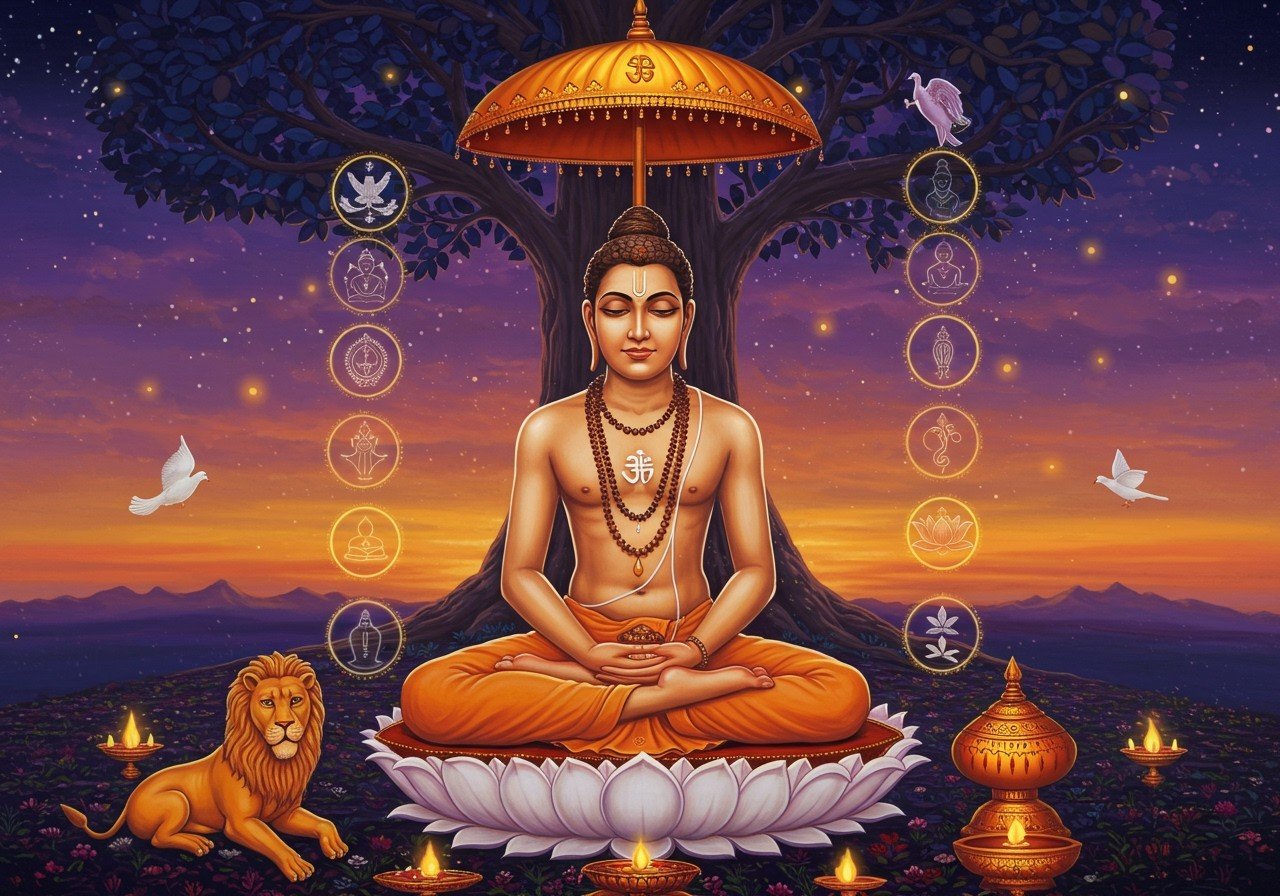Mahavira: The Spiritual Beacon of Jainism

Mahavira, also known as Vardhamana, stands as a central figure in Jainism, a revered ancient Indian religion. Jainism emphasizes non-violence, truth, and asceticism. Born in 599 BCE in Kundagram near Vaishali, India, Mahavira is celebrated as the 24th Tirthankara, or spiritual teacher, in Jain tradition. His teachings continue to guide millions of followers even today.
Early Life of Mahavira
Mahavira entered this world in Kundagrama, Bihar, near Vaishali, India, to Kshatriya king Siddhartha and Queen Trishala. Born into royalty, his name “Vardhamana” means “one who grows.” Despite his opulent upbringing, Mahavira sought spiritual fulfillment from an early age. At 30, he renounced his royal comforts to pursue enlightenment. Twelve years of intense meditation and ascetic practices led him to attain Kevala Jnana (omniscience).
Key Teachings of Mahavira
Mahavira’s teachings are encapsulated in the Five Great Vows (Mahavratas), which form the cornerstone of Jainism:
- Ahimsa (non-violence): Encourages compassion and non-violence towards all living beings, promoting a peaceful coexistence with all forms of life.
- Satya (truthfulness): Advocates speaking the truth and honesty in all dealings, fostering trust and integrity in personal and social interactions.
- Asteya (non-stealing): Opposes theft and exploitation in any form, emphasizing respect for the property and rights of others.
- Brahmacharya (celibacy): Promotes chastity and control over sensual pleasures, encouraging a focus on spiritual growth and detachment from worldly desires. This vow can also be interpreted as fidelity in marriage for lay followers.
- Aparigraha (non-possessiveness): Calls for detachment from material possessions and wealth, promoting a simple and mindful lifestyle free from the burdens of attachment.
Mahavira’s Contribution to Jainism
Mahavira played a pivotal role in shaping Jainism. He redefined and systematized existing beliefs, emphasizing self-discipline, penance, and meditation for spiritual liberation. His teachings were compiled into the Jain Agamas, the canonical scriptures of Jainism. Mahavira established the Sangha—a community of monks, nuns, and lay followers—to spread his teachings across India.
Philosophical Concepts Introduced by Mahavira
Mahavira introduced several profound philosophical concepts integral to Jain thought:
- Anekantavada: The doctrine of manifold viewpoints asserts that reality is complex and multifaceted, encouraging tolerance and understanding of diverse perspectives.
- Syadvada: The theory of conditional predication suggests that statements about reality are context-dependent, promoting nuanced thinking and avoiding absolute pronouncements.
- Karma: Mahavira emphasized the law of cause and effect, which governs the cycle of birth, death, and rebirth. Liberation (Moksha) is achieved by eradicating accumulated karma through right conduct, knowledge, and faith. This concept encourages personal responsibility and ethical living.
Impact of Mahavira’s Teachings on Society
Mahavira’s teachings have profoundly impacted Indian society. The principle of Ahimsa influenced social and political movements, including Mahatma Gandhi’s non-violent resistance against British rule. Jain communities are known for their charitable activities, ethical business practices, and animal welfare efforts. His emphasis on non-possessiveness and environmental sustainability resonates with modern concerns about consumption and ecological balance.
Modern Relevance of Mahavira’s Teachings
In today’s world, Mahavira’s teachings offer valuable insights for personal and social well-being. Non-violence and truthfulness foster harmonious relationships and ethical integrity. Non-possessiveness encourages sustainable living and mindfulness towards consumption. Self-discipline and inner peace help individuals navigate the complexities of modern life. Jain communities worldwide continue to uphold these values, adapting ancient wisdom to contemporary challenges.
How Poojn.in Supports Your Jain Spiritual Journey
Poojn.in offers essential items for practicing Jain rituals and following Mahavira’s teachings in your daily life. Our carefully curated collection includes:
- Pure cotton vastra (clothing) for temple visits and ceremonies: We provide a selection of high-quality, undyed cotton garments suitable for Jain worship, ensuring adherence to traditional practices. Browse our collection here.
- Brass and silver murti (statues) of Lord Mahavira for home temples: Our collection includes beautifully crafted murtis of Lord Mahavira, perfect for creating a sacred space in your home for prayer and reflection. Find your perfect murti here.
- Traditional Jain prayer beads (mala) for meditation and chanting: We offer a variety of malas made from natural materials, aiding in your meditation and chanting practices. Explore our mala selection here.
Visit Poojn.in to explore our complete range of Jain ritual items and spiritual supplies. We offer secure packaging and reliable delivery across India.
Conclusion
Mahavira’s legacy remains a testament to the enduring power of spiritual wisdom. His teachings continue to inspire compassion, truthfulness, and sustainable living for millions around the globe. By embracing his principles of non-violence, truth, and self-discipline, we can lead more meaningful lives. Mahavira’s timeless wisdom offers a path to inner peace and societal harmony, guiding us towards a better world.
FAQs on Mahavira: Life, Teachings, and Jainism
What did Mahavira preach? Mahavira preached the importance of the Five Vows: non-violence, truth, non-stealing, celibacy, and non-attachment. These principles form the foundation of Jain ethics and guide followers towards spiritual liberation.
What did Mahavira teach people? Mahavira taught people to live a life of simplicity, self-control, and compassion for all living beings. He emphasized the importance of inner transformation and the pursuit of enlightenment.
What did Mahavira say about non-violence? Mahavira considered non-violence (Ahimsa) the highest virtue. He encouraged his followers to avoid harming any living creature in thought, word, or deed.
For further exploration on related topics, consider reading these articles:
- Vedas: Ancient Wisdom for Modern Life – Practical Applications
- Karma in Hinduism: The Law of Cause and Effect Explained


